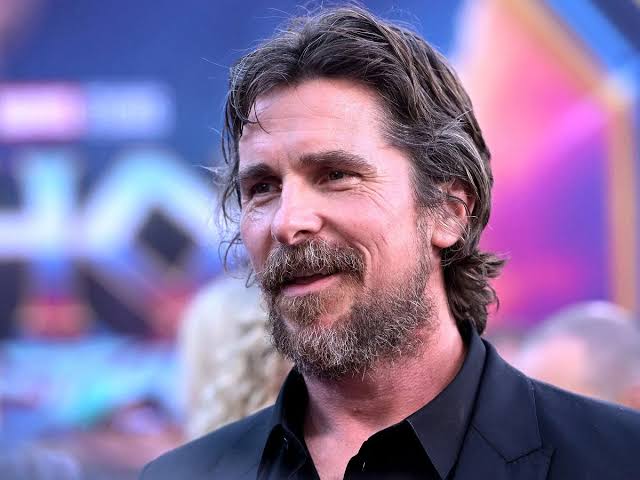Christian Bale is an acclaimed English actor celebrated for his adaptability and physical metamorphoses in portraying diverse roles across multiple genres.
He has garnered numerous awards, including an Academy Award and two Golden Globe Awards, and was recognized by Forbes magazine as one of the top-earning actors in 2014.
Early life and Education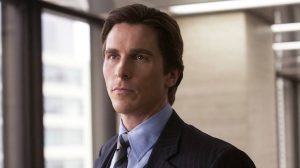
Christian Charles Philip Bale, born on January 30, 1974, in Haverfordwest, Pembrokeshire, hails from English lineage, with his parents, Jenny James and David Bale. Despite being born in Wales, Bale identifies as English. Raised with two sisters and a half-sister, Bale’s family roots are colorful, with one grandfather being a comedian and the other a stand-in for John Wayne. Bale’s upbringing was marked by frequent relocations, which influenced his career path. After attending Bournemouth School, he moved to Los Angeles with his family at age 17. Despite initially pursuing ballet and showing early signs of acting talent in commercials, Bale was hesitant about acting professionally until encouraged by others. Despite lacking formal training, he embarked on his acting journey, eventually making his mark in the entertainment industry.
Career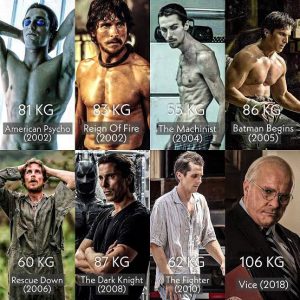
At the age of ten, Bale made the decision to pursue acting, leading to a minor role in the 1986 television film “Anastasia: The Mystery of Anna.” It was through this connection that he caught the attention of director Steven Spielberg, thanks to a recommendation from Amy Irving, the film’s star. This led to Bale’s breakthrough role in Spielberg’s 1987 film “Empire of the Sun,” where at just 13 years old, he was selected from thousands of actors to portray a British boy in a World War II Japanese internment camp. Bale’s performance in the film earned him widespread acclaim and the inaugural Best Performance by a Juvenile Actor Award from the National Board of Review of Motion Pictures. Despite the success, the newfound fame brought challenges, including bullying in school and the pressure of being in the spotlight. However, he found renewed passion for acting after being persuaded by Kenneth Branagh to appear in “Henry V” in 1989. Additionally, in 1990, Bale starred as Jim Hawkins in a television film adaptation of “Treasure Island” alongside Charlton Heston as Long John Silver.
In 1992, Bale took on a role in the Disney musical film “Newsies,” which, despite being unsuccessful both commercially and critically, showcased his talent, with Rebecca Milzoff of Vulture appreciating his performance despite vocal limitations. The following year, he appeared in “Swing Kids,” exploring the rebellious spirit of teenagers in Nazi Germany. Bale’s versatility shone through in 1994’s “Little Women,” where he portrayed Theodore “Laurie” Laurence, earning praise from co-star Winona Ryder for capturing the character’s complexity. He then lent his voice to the character of Thomas in Disney’s “Pocahontas” (1995), followed by roles in “The Portrait of a Lady” (1996) and the musical film “Velvet Goldmine” (1998). In 1999, he joined an ensemble cast in “A Midsummer Night’s Dream,” bringing Shakespeare’s Demetrius to life alongside Kevin Kline and Michelle Pfeiffer.
In “American Psycho” (2000), Bale portrayed the infamous character Patrick Bateman, an investment banker and serial killer, in the film adaptation of Bret Easton Ellis’s novel. Initially, there was disagreement over casting, with Lionsgate opting for Leonardo DiCaprio and Oliver Stone to direct. However, Bale and director Mary Harron eventually reclaimed their roles after DiCaprio and Stone left the project. Bale dedicated himself to the role, undergoing physical transformations and adopting Bateman’s narcissistic traits. Premiering at the 2000 Sundance Film Festival, the film initially faced mixed reactions but later gained commercial success and a cult following, solidifying Bale’s status as a leading actor. Roger Ebert praised Bale’s performance, noting his fearless portrayal of the character’s despicability.
Following the success of “American Psycho,” Bale’s career faced a period of critical and commercial setbacks. He portrayed a villainous real estate heir in “Shaft” and took on the role of Mandras, a Greek fisherman, in “Captain Corelli’s Mandolin” (2001). Bale found the latter role refreshing after the intensity of his previous projects. In 2002, he appeared in multiple films, including “Laurel Canyon,” “Reign of Fire,” and “Equilibrium.” While some reviews criticized his performance in “Laurel Canyon,” Bale embraced the challenges of “Reign of Fire,” despite reservations about its CGI-heavy production, and showcased his skills in the futuristic action film “Equilibrium.” Bale’s most notable transformation during this period was for “The Machinist” (2004), where he portrayed an insomnia-ridden character by drastically losing weight. Despite the film’s poor box office performance, Bale’s performance earned critical acclaim, with some critics ranking it among the best of the year.
In Christopher Nolan’s “Batman Begins” (2005), Bale took on the iconic roles of American billionaire Bruce Wayne and his alter ego, Batman, in a reboot of the Batman film series. Despite being relatively unknown at the time, Nolan was drawn to Bale’s ability to balance darkness and light, a quality he felt was essential for the character. Bale underwent a physical transformation, regaining the weight he had lost for “The Machinist” and building muscle to embody the superhero. He immersed himself in various martial arts and combat training to prepare for the role, striving for a realistic portrayal of a character driven by the trauma of his parents’ murder. Bale distinguished between Wayne and Batman through vocal nuances, adopting a gravelly tone for the latter to complement the character’s intimidating appearance. “Batman Begins” received praise for Bale’s sensitive and intelligent portrayal of Bruce Wayne’s journey, earning him accolades such as the MTV Movie Award for Best Hero.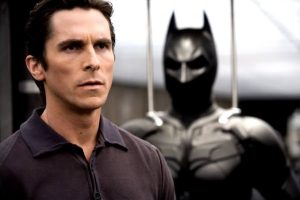
In 2005, Bale lent his voice to the character Howl in the English-language version of Hayao Miyazaki’s “Howl’s Moving Castle,” influenced by his admiration for Miyazaki’s work after watching “Spirited Away.” He then portrayed a US war veteran grappling with post-traumatic stress disorder in “Harsh Times” and colonist John Rolfe in Terrence Malick’s “The New World.” The following year, he starred as US fighter pilot Dieter Dengler in Werner Herzog’s “Rescue Dawn,” earning praise for his portrayal of yet another American persona. Reuniting with director Christopher Nolan for “The Prestige” (2006), Bale delivered a compelling performance as a Victorian-era magician, garnering critical acclaim. He continued to showcase his versatility in 2007, portraying two incarnations of Bob Dylan in “I’m Not There” and a justice-seeking cattleman in “3:10 to Yuma.” Bale reprised his role as Batman in Nolan’s “The Dark Knight” (2008), which achieved both critical acclaim and commercial success, cementing its place as one of the greatest superhero films.
In February 2008, Bale was announced to star as John Connor in “Terminator Salvation,” a post-apocalyptic action film directed by McG. Despite initial excitement, the film faced controversy when an audio recording of Bale berating the cinematographer on set was leaked in February 2009. The incident sparked widespread debate, with some defending Bale’s dedication to his craft, while others criticized his behavior. Bale publicly apologized for his outburst, acknowledging it as “inexcusable” and expressing regret for his actions. Despite the controversy, “Terminator Salvation” was released in May 2009 to mixed reviews, with some critics finding Bale’s performance lacking depth. Bale later admitted his disappointment with the film’s reception and stated he would not collaborate with McG again.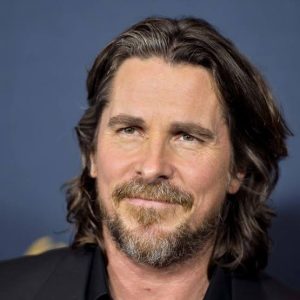
In Michael Mann’s crime drama “Public Enemies” (2009), Bale portrayed FBI agent Melvin Purvis opposite Johnny Depp as gangster John Dillinger. Despite some critics feeling that the chemistry between Bale and Depp was lacking, the film earned critical praise and enjoyed commercial success. The following year, Bale delivered a transformative performance as Dicky Eklund, a former boxer battling drug addiction, in David O. Russell’s “The Fighter.” Bale’s portrayal, characterized by a balance of tragedy and humor, earned him widespread acclaim, leading to Academy Award and Golden Globe wins for Best Supporting Actor. In 2011, Bale starred in Zhang Yimou’s historical drama “The Flowers of War,” which became the highest-grossing Chinese film of the year. However, the film received mixed reviews, with critics citing its nationalistic and melodramatic elements.
In “The Dark Knight Rises” (2012), Bale reprised his role as Batman under Christopher Nolan’s direction. He portrayed the character as a remorseful recluse, grappling with poor mental and physical health following the events of the previous film. After the tragic shooting in Aurora, Colorado, Bale and his wife visited survivors and first responders, demonstrating compassion and support for those affected. “The Dark Knight Rises” became another blockbuster success, surpassing its predecessor to become the 11th film to gross over $1 billion worldwide. Nolan’s Batman trilogy, known as the Dark Knight trilogy, is celebrated as one of the highest-grossing and most critically acclaimed film franchises, with Bale’s portrayal of Batman earning universal acclaim. Despite this, Bale later expressed his dissatisfaction with his performance, feeling that he hadn’t fully realized his vision for the character.
In 2013, Bale showcased his versatility by portraying a steel mill worker in Scott Cooper’s thriller “Out of the Furnace.” Cooper specifically tailored the script with Bale in mind, highlighting the actor’s integral role in the project. Critics praised Bale’s performance, with some suggesting it marked a promising new phase in his career post-Batman. The same year, he starred in “American Hustle,” reuniting with director David O. Russell after their collaboration on “The Fighter.” Bale underwent a remarkable physical transformation and immersed himself in his role as con artist Irving Rosenfeld, earning critical acclaim and award nominations for his performance.
Bale continued to take on challenging roles, portraying Moses in Ridley Scott’s epic “Exodus: Gods and Kings” (2014), a role that drew controversy due to accusations of whitewashing. Despite mixed reviews for the film, Bale’s performance garnered criticism, with some finding it lacking in energy. He also appeared in Terrence Malick’s “Knight of Cups” and Adam McKay’s “The Big Short,” showcasing his range and versatility as an actor. For his role in “The Big Short,” Bale received nominations for Academy Award and Golden Globe Award for Best Supporting Actor.
In subsequent years, Bale starred in various films, including the historical drama “The Promise” (2016) and the western “Hostiles” (2017), where he delivered powerful performances that were praised by critics. He also lent his voice to the character Bagheera in “Mowgli: Legend of the Jungle” (2018), demonstrating his ability to captivate audiences through voice acting. Throughout his career, Bale has consistently challenged himself with diverse roles, earning acclaim for his dedication and talent.
In 2018’s “Vice,” Bale underwent another significant physical transformation to portray US Vice President Dick Cheney, gaining over 40 pounds and shaving his head. He delivered a compelling performance, earning critical acclaim and winning the Golden Globe Award for Best Actor in a Motion Picture Musical or Comedy. However, his acceptance speech sparked controversy when he jokingly thanked Satan, drawing a response from Cheney’s daughter.
The following year, Bale portrayed sports car racing driver Ken Miles in “Ford v Ferrari,” shedding the weight gained for “Vice.” Directed by James Mangold, the film garnered Bale another Golden Globe nomination for his performance.
In 2022, Bale joined the Marvel Cinematic Universe as the villain Gorr the God Butcher in “Thor: Love and Thunder,” receiving praise for his grounded portrayal. He also produced and appeared in David O. Russell’s “Amsterdam” and Scott Cooper’s “The Pale Blue Eye,” both of which received mixed reviews.
Bale’s upcoming projects include voicing a character in the English-language dub of Hayao Miyazaki’s animated film “The Boy and the Heron” and portraying Frankenstein’s monster in Maggie Gyllenhaal’s “The Bride!”. His diverse roles showcase his versatility and dedication to his craft.
Bale’s career is a testament to his immense talent, versatility, and dedication to his craft.
Personal life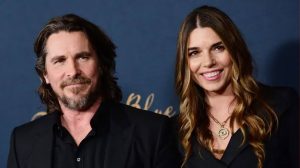
Bale has been a resident of Los Angeles since the 1990s and holds US citizenship. He married Sandra “Sibi” Blažić, a former model, in Las Vegas in 2000, and they have a daughter and a son. Bale’s father remarried feminist Gloria Steinem, making her Bale’s stepmother until his father’s passing in 2003 due to brain lymphoma.
Bale adopted vegetarianism at the age of seven, inspired by the book “Charlotte’s Web,” though he has since fluctuated in his dietary choices. He is an active supporter of various animal rights organizations, including Greenpeace, the World Wide Fund for Nature, and others. Bale has engaged in activism, such as attempting to visit confined lawyer Chen Guangcheng in China and co-founding California Together, an organization aiding siblings in foster care.
Legal issues
In 2008, Bale was briefly arrested in London following allegations of assault by his mother and sister at a hotel. However, the Crown Prosecution Service later dropped the case due to insufficient evidence. Bale maintained his innocence, describing the incident as a “deeply personal matter.”
Net Worth
Christian Bale’s net worth is estimated to be around $120 million.


